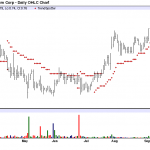Roger Bootle once wrote:
The whole of economic life is a mixture of creative and distributive activities. Some of what we ‘‘earn’’ derives from what is created out of nothing and adds to the total available for all to enjoy. But some of it merely takes what would otherwise be available to others and therefore comes at their expense.
Successful societies maximise the creative and minimise the distributive. Societies where everyone can achieve gains only at the expense of others are by definition impoverished. They are also usually intensely violent….
Much of what goes on in financial markets belongs at the distributive end. The gains to one party reflect the losses to another, and the fees and charges racked up are paid by Joe Public, since even if he is not directly involved in the deals, he is indirectly through costs and charges for goods and services.
The genius of the great speculative investors is to see what others do not, or to see it earlier. This is a skill. But so is the ability to stand on tip toe, balancing on one leg, while holding a pot of tea above your head, without spillage. But I am not convinced of the social worth of such a skill.
This distinction between creative and distributive goes some way to explain why the financial sector has become so big in relation to gross domestic product – and why those working in it get paid so much.
Roger Bootle has written several books, notably The Trouble with Markets: Saving Capitalism from Itself.
I came across this quote while reading today’s Outside the Box, which comes from my friend Joan McCullough. She didn’t actually cite it but mentioned Bootle in passing, and I googled him, which took me down an alley full of interesting ideas. I had heard of him, of course, but not really read him, which I think may be a mistake I should correct.
But today we are going to focus on Joan’s own missive from last week, which she has graciously allowed me to pass on to you. It’s a probing examination of how and why the financialization of the US and European (and other developed-world) economies has become an anchor holding back our growth and future well-being. Joan lays much of the blame at the feet of the Federal Reserve, for creating an environment in which financial engineering is more lucrative than actually creating new businesses and increasing production and sales.














Leave A Comment